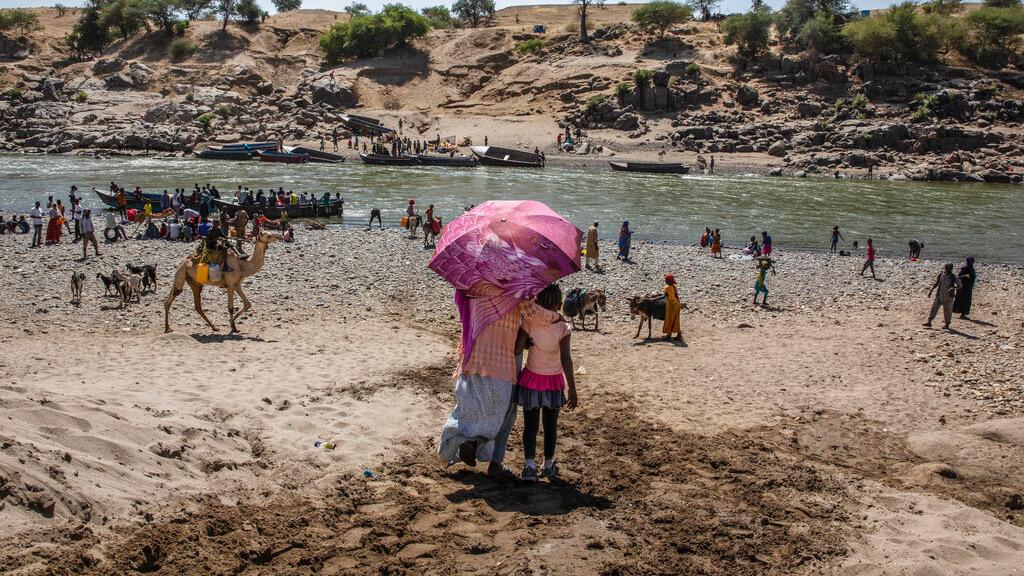Three months have passed since the conflict erupted in Ethiopia’s Tigray region between the Tigray People’s Liberation Front and Ethiopia’s federal government.
While Ethiopia’s Prime Minister Abiy Ahmed proclaimed victory in November, fighting continues in some areas of Tigray.
Related: From Sudan, Ethiopian refugees tell their stories
Over 60,000 Ethiopians have fled to neighboring Sudan and the millions that remain in Ethiopia now face a worsening humanitarian crisis.
“There is no area that is not affected by this conflict. The situation in Ethiopia is deteriorating every day and every minute.”
“There is no area that is not affected by this conflict,” said Ato Abera Tola, president of the Ethiopian Red Cross Society, during a recent press conference. “The situation in Ethiopia is deteriorating every day and every minute.”
For months, Ethiopia’s federal government has restricted the United Nations and other international agencies from accessing much of the region, where millions of people are in need of food assistance and health care.
On Saturday, the United Nations’ food agency reached a deal with Ethiopia’s government to scale up its humanitarian access in the region.
Related: Tensions mount at Sudan-Ethiopia border as refugees flee Tigray conflict
“There are millions of people in need here in the Tigray region because of the conflict,” said World Food Program Director David Beasley in a video posted on social media from Tigray’s capital, Mekelle. “People are hungry.”
WFP will provide emergency food relief and transportation in support of the Ethiopian government’s ongoing humanitarian efforts.
“Our government is focused on rehabilitation, reconstruction and on humanitarian issues, while also addressing issues related to refugees,” said Ethiopia’s Deputy Prime Minister Demeke Mekonnen during a recent press conference.
More than 90,000 refugees from neighboring Eritrea live in the Tigray region, and many have been caught in the crosshairs of the recent conflict.
Related: Ethiopians from conflict-torn Tigray region say they face ethnic profiling
Last week, the UN High Commissioner for Refugees Fillipo Grandi was able to visit the Mai-Aini refugee camp in southern Tigray after months of being prevented from traveling there.
“They also spoke of infiltration of armed actors in the camps, of killings, abductions and also some forced return to Eritrea at the hands of Eritrean forces present in the areas,” Grandi told the press.
Ethiopia has been accused of receiving support from Eritrean troops during the conflict in Tigray, including by Ethiopian refugees interviewed by The World in neighboring Sudan. Both countries have denied these allegations.
But the United States has said there are “credible reports of looting, sexual violence, assaults in refugee camps.”
Both the United States and the European Union have urged Eritrean troops to leave.
One Eritrean refugee in the Adi-Harush camp says he is concerned about the reports of Eritrean troops and forced returns.
The refugee, who asked to remain anonymous for safety reasons, said that while Adi-Harush had avoided the worst of the conflict, some refugees there have been injured and killed in spurts of violence.
“The situation is very bad. There is pressure. There is fear. From whom is the force harming us? Who is killing us?”
“The situation is very bad. There is pressure. There is fear. From whom is the force harming us? Who is killing us?” the man said.
Reports have also emerged of the destruction of two refugee camps in northern Tigray.
Related: Ethiopians struggle to reach loved ones inside the Tigray region
In a statement on Monday, the Norwegian Refugee Council, citing satellite imagery, said its buildings and facilities had been destroyed in the Hitsats and Shimelba refugee camps in recent weeks.
The NRC, UN refugee agency, and other aid organizations remain unable to visit these camps and the neighboring town of Shire, according to a UN spokesperson.
